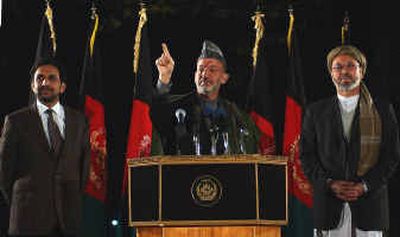Afghan leader says he’ll handle warlords

KABUL, Afghanistan – Hamid Karzai pledged Thursday to use his five-year term as Afghanistan’s first elected president to crack down on warlords and the re-emerging country’s booming drug economy.
Accepting his victory in the historic Oct. 9 ballot, he also offered an olive branch to the Taliban, even as an offshoot of the former ruling militia threatened to kill three kidnapped U.N. workers who helped organize the vote.
“The Afghan people have placed their trust in us, for which we are very grateful,” Karzai said in the grounds of his bomb-damaged Kabul palace, flanked by his two smiling running-mates and circled by bodyguards. “They voted for a government based on laws and institutions, and that is what we are going to provide.”
Karzai has said that smashing Afghanistan’s opium and heroin smugglers will be his top priority, and the key to reining in warlords resisting the feeble authority of the central government.
He has also pledged to clear his Cabinet of faction leaders who helped the United States oust the Taliban three years ago but have proved to be deadweights in office.
Asked if any warlords or government officials believed to profit from drugs would survive the purge, Karzai said: “There will not be any private militia forces in Afghanistan.”
“There will definitely, definitely not be any drug thing in Afghanistan,” he said. “We’re going to be dedicated, strong in working against that.”
He said he would not announce his Cabinet before his inauguration in December.
But he renewed an offer to followers of the Taliban – with the exception of a few dozen top fugitives – “to come and participate in the rebuilding of this country.”
“The rest of them, thousands of them, they are sons of this earth, they are welcome,” he said.
Election officials declared Karzai the winner Wednesday after more than three weeks of laborious counting and arguments about whether he had cheated his way to victory.
Yunus Qanooni, who finished second with 16 percent, compared with Karzai’s 55 percent, accepted the result just hours before Karzai made his televised acceptance speech.
“For me, Afghanistan’s national interests are the most important,” said Qanooni, Karzai’s former education minister. “If we didn’t accept the result, the country would go toward a crisis.”
Ethnic Hazara chieftain Mohammed Mohaqeq and Uzbek strongman Abdul Rashid Dostum followed suit.
Foreign experts drafted to examine the allegations found a string of irregularities, including ballot-stuffing, but said they couldn’t have changed the result.
Karzai has vowed to accelerate the slow rebuilding of a country after war and drought with the goal of doubling the income of Afghans by 2009.
But any attempt to focus on the economy will be complicated by the challenge of confronting warlords, drug traffickers and Taliban militants all at the same time.
Karzai denounced as “terrorist elements” an armed group who kidnapped three foreign election workers in Kabul a week ago.
Jaish-al Muslimeen, a little-known militant band, said Thursday that talks on demands including the release of Taliban prisoners had broken down, and that they would decide today whether to kill the three — Irish-British citizen Annetta Flanigan, Filipino Angelito Nayan and Shqipe Hebibi from Kosovo.
A purported commander of the group said U.N. and Afghan officials contacted them by telephone Thursday but were “not ready for negotiations.”
“We have decided that we won’t negotiate any more either, because they are not making a serious effort to get the hostages released,” a man identifying himself as Sadir Momin said in a satellite telephone call.
Another meeting will be held today, “then we will decide whether to kill them or allow more time,” Momin said.